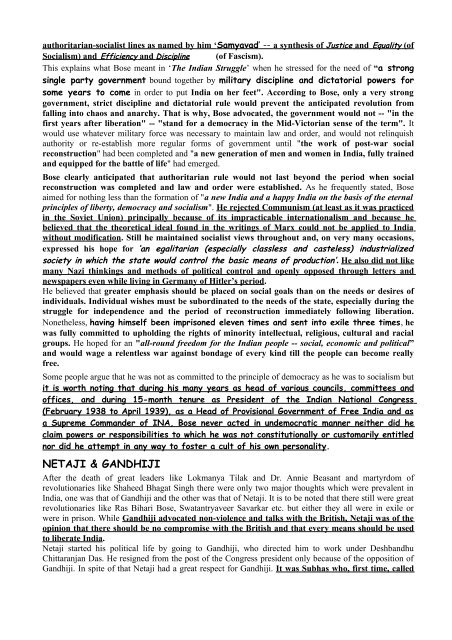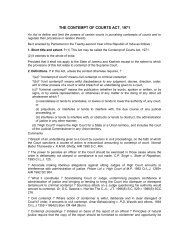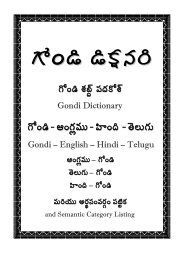You also want an ePaper? Increase the reach of your titles
YUMPU automatically turns print PDFs into web optimized ePapers that Google loves.
authoritarian-socialist lines as named by him ‘ Samyavad’<br />
-- a synthesis of Justice and Equality (of<br />
Socialism) and Efficiency and Discipline (of Fascism).<br />
This explains what Bose meant in ‘The Indian Struggle’ when he stressed for the need of “a strong<br />
single party government bound together by military discipline and dictatorial powers for<br />
some years to come in order to put India on her feet". According to Bose, only a very strong<br />
government, strict discipline and dictatorial rule would prevent the anticipated revolution from<br />
falling into chaos and anarchy. That is why, Bose advocated, the government would not -- "in the<br />
first years after liberation" -- "stand for a democracy in the Mid-Victorian sense of the term". It<br />
would use whatever military force was necessary to maintain law and order, and would not relinquish<br />
authority or re-establish more regular forms of government until "the work of post-war social<br />
reconstruction" had been completed and "a new generation of men and women in India, fully trained<br />
and equipped for the battle of life" had emerged.<br />
Bose clearly anticipated that authoritarian rule would not last beyond the period when social<br />
reconstruction was completed and law and order were established. As he frequently stated, Bose<br />
aimed for nothing less than the formation of "a new India and a happy India on the basis of the eternal<br />
principles of liberty, democracy and socialism". He rejected Communism (at least as it was practiced<br />
in the Soviet Union) principally because of its impracticable internationalism and because he<br />
believed that the theoretical ideal found in the writings of Marx could not be applied to India<br />
without modification. Still he maintained socialist views throughout and, on very many occasions,<br />
expressed his hope for ‘an egalitarian (especially classless and casteless) industrialized<br />
society in which the state would control the basic means of production’. He also did not like<br />
many Nazi thinkings and methods of political control and openly opposed through letters and<br />
newspapers even while living in Germany of Hitler’s period.<br />
He believed that greater emphasis should be placed on social goals than on the needs or desires of<br />
individuals. Individual wishes must be subordinated to the needs of the state, especially during the<br />
struggle for independence and the period of reconstruction immediately following liberation.<br />
Nonetheless, having himself been imprisoned eleven times and sent into exile three times, he<br />
was fully committed to upholding the rights of minority intellectual, religious, cultural and racial<br />
groups. He hoped for an "all-round freedom for the Indian people -- social, economic and political”<br />
and would wage a relentless war against bondage of every kind till the people can become really<br />
free.<br />
Some people argue that he was not as committed to the principle of democracy as he was to socialism but<br />
it is worth noting that during his many years as head of various councils, committees and<br />
offices, and during 15-month tenure as President of the Indian National Congress<br />
(February 1938 to April 1939), as a Head of Provisional Government of Free India and as<br />
a Supreme Commander of INA, Bose never acted in undemocratic manner neither did he<br />
claim powers or responsibilities to which he was not constitutionally or customarily entitled<br />
nor did he attempt in any way to foster a cult of his own personality.<br />
NETAJI & GANDHIJI<br />
After the death of great leaders like Lokmanya Tilak and Dr. Annie Beasant and martyrdom of<br />
revolutionaries like Shaheed Bhagat Singh there were only two major thoughts which were prevalent in<br />
India, one was that of Gandhiji and the other was that of Netaji. It is to be noted that there still were great<br />
revolutionaries like Ras Bihari Bose, Swatantryaveer Savarkar etc. but either they all were in exile or<br />
were in prison. While Gandhiji advocated non-violence and talks with the British, Netaji was of the<br />
opinion that there should be no compromise with the British and that every means should be used<br />
to liberate India.<br />
Netaji started his political life by going to Gandhiji, who directed him to work under Deshbandhu<br />
Chittaranjan Das. He resigned from the post of the Congress president only because of the opposition of<br />
Gandhiji. In spite of that Netaji had a great respect for Gandhiji. It was Subhas who, first time, called




